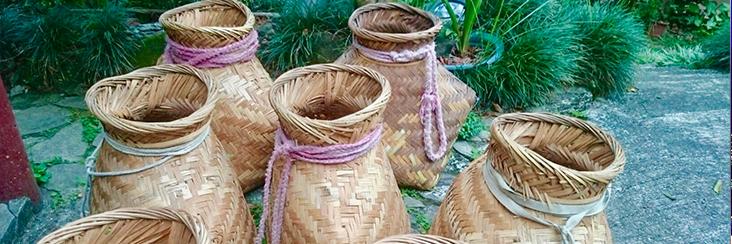
Tieguanyin Oolong Tea | Eco-Cha Tea Club

This farm is the only place we've seen the baskets shown above still being used in Taiwan for harvesting tea by hand. They are now typically displayed as a memoir of generations past. This in itself is a symbol for the tradition that this farmer has made his vocation to preserve. At the young age of 20, he inherited his family farm in the historical tea producing area of Muzha in Taipei County, and has dedicated the last 30 years of his life to keeping the tradition alive by making the type of tea for which this place name has been renowned for well over 100 years - Tieguanyin Oolong.

The snapshot above that the farmer took on his phone captures both the organically grown heirloom strain of Tienguanyin in the foreground and the rural environment that still exists in the hills just outside of Taiwan's capital city of Taipei. It really is a bit magical to leave this sprawling metropolis behind and enter another world in less than an hour. This family manages the simplest style of a tea house right out of their home, accessible only by stone paths and hiking trails that lead right through their property!


Traditional Tieguanyin Oolong tea making in this historical region is sadly a dying craft that is barely surviving in our current generation. And this guy is an anomaly in our experience of exploring the tea industry in Taiwan for over 20 years. Both his farm and his factory are the smallest scale production we've ever seen in Taiwan. He organically cultivates his own plots of this heirloom tea strain in this secluded valley, harvests them by hand, and processes them in his home factory that can only make about 30 kg at a time! This is virtually unheard of nowadays, where large scale modern factories can make up to 500kg of tea a day.

Traditionally made Tieguanyin Oolong entails a labor intensive, time consuming process of slowly oxidizing the leaves. It takes about twice as long as other Oolong types to make. It also involves a unique drying and roasting process where the leaves are put in low temperature ovens while still somewhat moist and wrapped in cloth balls that are commonly used for rolling the tea leaves. This results in a slightly tangy, smoky character in the finished product that is unique to Tieguanyin Oolong.
Given the minimal amount of leaves that this tiny farm produces on a seasonal basis, this farmer also purchases fresh leaf from neighboring farms that grow Jin Xuan Oolong to process in the traditional Tieguanyin fashion. He then combines these batches of Tieguanyin and Jin Xuan together in order to make his operation economical enough to survive while representing the characteristic profile of this tea.

In sum, we are super excited to have gotten to know this source of traditional Tieguanyin in the last couple years, and this is the first time we are sharing tea from this source. We look forward to making many more journeys from our home central Taiwan to visit our "tea hero" in the north who is doing great things to keep this rich Taiwanese tea tradition of Tieguanyin Oolong alive!


